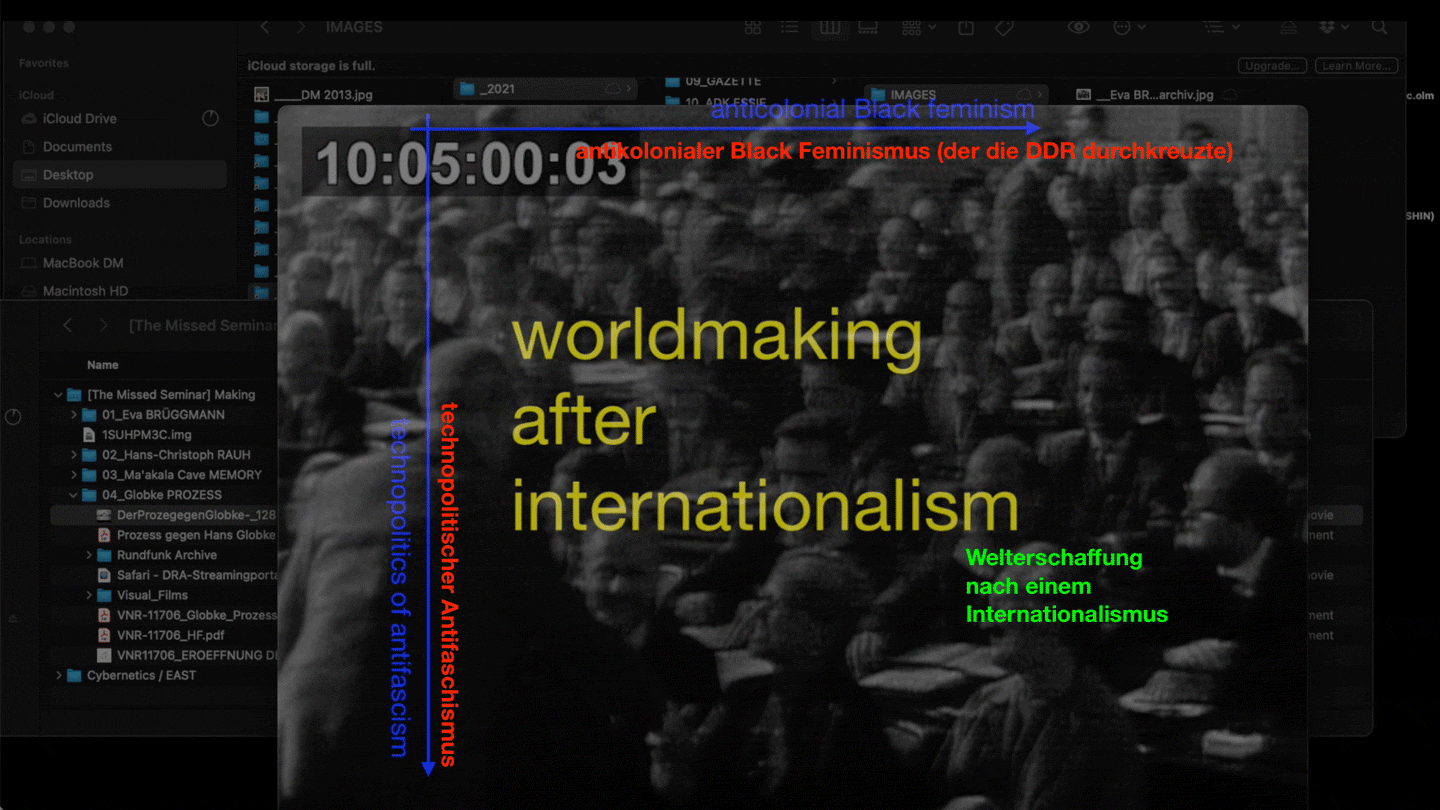After Eslanda Robeson. In conversation with Steve McQueen’s End Credits
October 28–December 30, 2022
John-Foster-Dulles-Allee 10
10557 Berlin
Germany
T +49 30 397870
F +49 30 3948679
info@hkw.de
End Credits (2012–2022) by Steve McQueen
screenings: October 27–31, November 17–21, December 21–30
October 29, a conversation with Avery F. Gordon, Charisse Burden Stelly, Doreen Mende, Charlotte Misselwitz and Zoé Samudzi
November 19, talks and conversations with Barbara Ransby, Yulia Gradskova and others
Conceptualized by Doreen Mende in conversation with Avery F. Gordon, Lama El Khatib, Aarti Sunder and Katharina Warda
The Missed Seminar After Eslanda Robeson is an archive-based exhibition that resonates in dialogue with the audiovisual installation End Credits (2012–22) by the artist and filmmaker Steve McQueen. As a disquiet portal to rewind potential knowledge that refuses global racial capitalism, the conversation departs from the lives of the Black feminist anthropologist, anticolonial writer, world traveler, and African-American photographer Eslanda “Essie” Goode Robeson and Paul LeRoy Robeson, with a particular focus on their friendships in the German Democratic Republic (GDR), and beyond. Conceived as a situated reading of transcontinental world-making practices that reveal and upset the Cold War’s extreme binarism, The Missed Seminar is not a historical reconstruction of the Robesons’ legacies, but a transtemporal metabolization of archival matter––images, scripts, files, films, and Spirituals––that narrates the fearlessness, love, and struggles of living an “antiphonal life” (Shana L. Redmond) that vibrates in the present. More a study than a documentation, it aims to unfold methods that connect, in particular, Eslanda’s practices of antifascism, anticolonialism, Black feminism, and communist comradery using photography, cinema, Spirituals, and techno-politics under the state-pressures of global wartime politics. It imagines a seminar which might neither have been documented nor realized but which students wishing to rehearse an intersectional practice of critique, resistance, and imagination for fighting fascism, colonialism, and antisemitism would have attended. Imagined as unfinished conversations, The Missed Seminar reimagines a repressed intersectional communism, invoking and shifting the geopolitics of memory in a present that remains under pressure from the legacies of various imperial divisions of the world—including those of the Cold War.
Lasting 12 hours and 54 mins (video duration) and 42 hours and 6 minutes (audio duration), End Credits by Steve McQueen exposes thousands of digitized FBI files as they scroll up slowly on the large-scale screen: file numbers, dates, registration codes, some heavily redacted or blacked out, as well as forty-two hours of asynchronous voice recordings that render the FBI informants’ reports audible. Installed in the auditorium of the Haus der Kulturen der Welt (HKW) in Berlin, a Cold War architecture par excellence, it is a haunting monument to the state surveillance and smear campaigns organized by the US government against Eslanda Robeson as well as the renowned singer, actor, lawyer, and social activist Paul Robeson. Banned from travel and work outside the United States between 1950 and 1958, both were welcomed, supported, and celebrated in communist and nonaligned countries around the world. The durational exorbitance of End Credits exposes the pathology of the US anticommunist hatred that violated Paul and Eslanda Robeson’s basic human rights while, at the same time, it demonstrates their lifelong fight for freedom, humanity, and justice otherwise in conversation with friends of Pan-African, worker’s, women’s and communist movements. In this premiere of the installation in its complete form at HKW, the large-scale projection becomes a monumental confrontation at the heart of the former Congress Hall, a space that was gifted by the same anticommunist US government to the city of West-Berlin after the Second World War. In opposition to the people of East Berlin, quite literally at their border, the Congress Hall was designed to promote anticommunism as conditioning for de-Nazification and the concept of “freedom.” Thus, the installation is an exhibit that denounces, both in curatorial and juridical terms, the promises of liberal democracy as tools of war.
In dialogue with the hi-res exposure of US anticommunism in End Credits, The Missed Seminar After Eslanda Robeson is both an exhibition and a study that re-searches (for) the friendship between Eslanda Robeson and the German-Jewish Marxist philosopher of logic Franz Loeser, situated in East Berlin around the year 1963. More a diagram than a representation, it honors Eslanda Robeson, with particular care paid to the relevance of her encounters with students’ and women’s movements East-Berlin and elsewhere, her “large and unconventional life” (Barbara Ransby) that is too often overshadowed by her husband’s. Beside her “writings as a political act” (Katharina Warda) and photographs of a “Pan-African gaze” (Leigh Raiford), The Missed Seminar’s critical vector is a photograph of Eslanda Robeson and Franz Loeser meeting in East-Berlin: on July 8, 1963, they attend the Supreme Court of the GDR together to witness the prosecution of Hans Globke in absentia, an internationally media-covered trial against fascism and its proponents who continued to hold power in the systems of postwar West Germany, or, a real-theatrical staging of antifascism as Cold War politics. The Missed Seminar wishes to celebrate the futurity of the Robeson’s lived friendships, encounters, and narratives, inscribed into the unconscious of former communist geographies in Europe, which too often are erased from communism’s potential histories. Utilizing sonic, visual and display methods and, at the same time, mobilizing archival matter as study material in Black feminist anticolonial internationalism, it aspires to show the necessity of these methods, provoking symptoms of ongoing political depression after 1990, in fighting fascism, colonialism and antisemitism. It aims to be an exercise that reflects on the ambivalence of euro-socialism’s historic claim for antifascism as state-crafting that operated also, however, a state power and thus isolated the Robesons as “so comfortably un-German […] without necessarily having to wrestle with East German anti-Black racism” (Kira Thurman). In exploring “a past the present hasn’t caught up with yet” (Avery F. Gordon) or a “history future” (Matana Roberts), could such an approach constitute a practice of decolonizing socialism from Cold War global politics? Could such a study invoke an interracial imaginary through anticolonial Black feminist internationalism and transcontinental world-making for the purpose of activating an intersectional geopolitics of memory in the present?
The project will be continued in the form of a print-publication of a conversation between Steve McQueen and Doreen Mende on End Credits, dossier on the digital platform VOICES and a vitrine-intervention in the permanent collection of modern art in the Albertinum of the State Collections of Art, Dresden (SKD).
The Missed Seminar After Eslanda Robeson In Conversation With Steve McQueen’s End Credits is developed in the context of Decolonizing Socialism. Entangled Internationalism (2019–2024), funded by the Swiss National Science Foundation and HEAD Genève, in partnership with HKW and Staatliche Kunstsammlungen Dresden (SKD). It is part of HKW’s project The New Alphabet, supported by the Federal Government Commissioner for Culture and the Media due to a ruling of the German Bundestag.
Press contact
Jan Trautmann, Head of Press and PR, Haus der Kulturen der Welt
John-Foster-Dulles-Allee 10, 10557 Berlin
T + 49 (0) 30 39787-192 / presse [at] hkw.de


